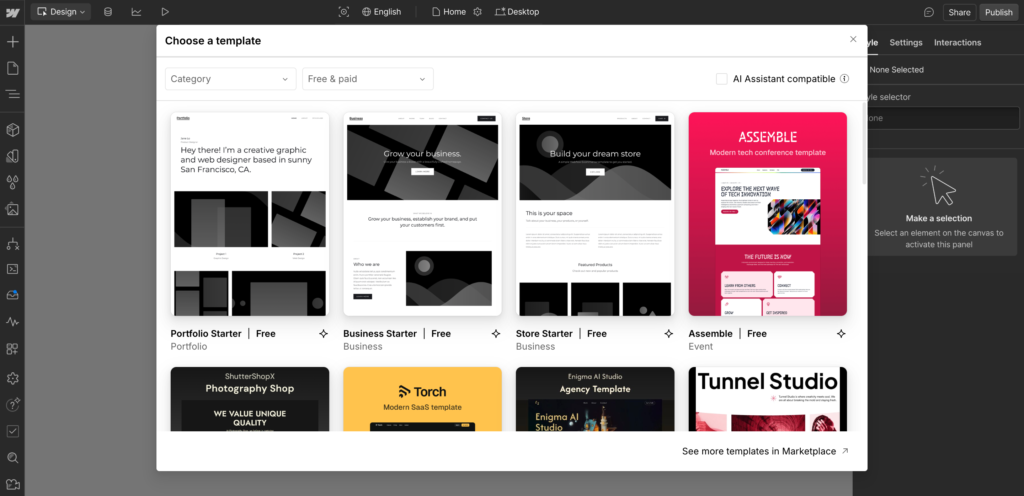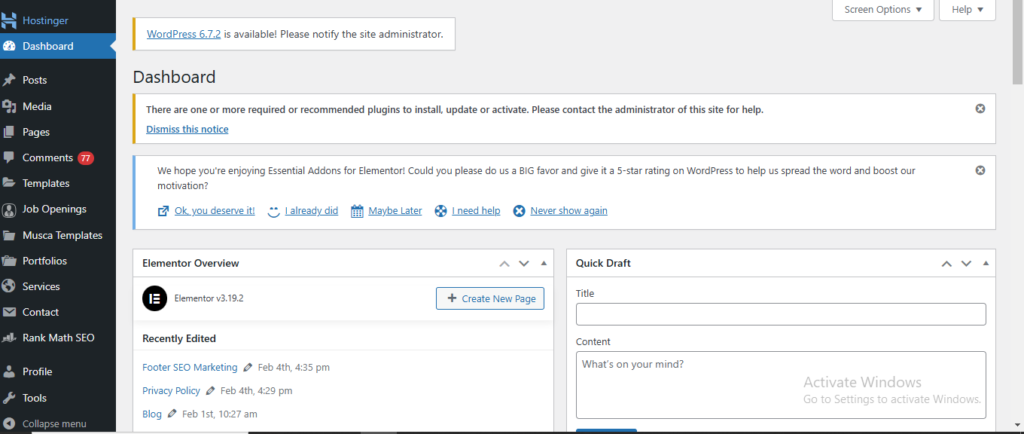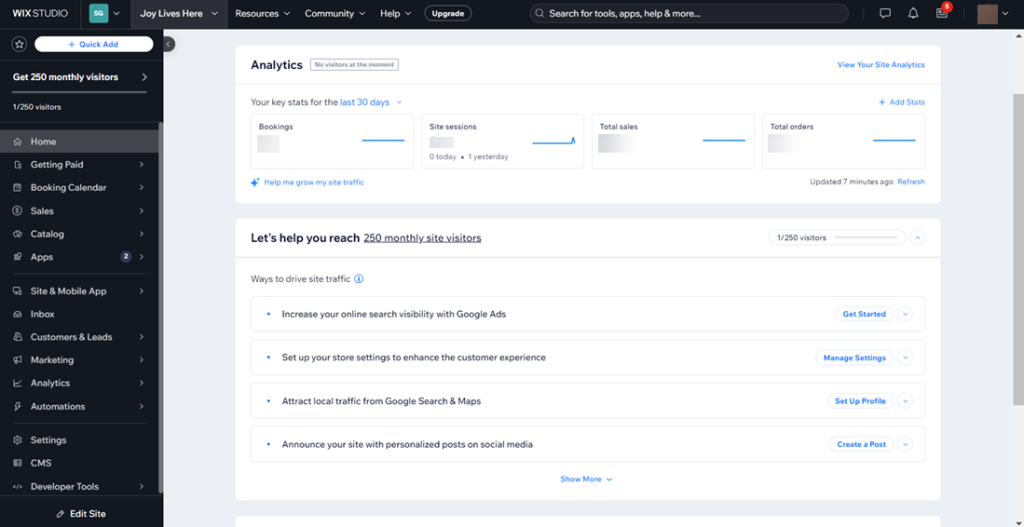If you’re building a website, SEO is a crucial factor to consider. A well-optimized website can rank higher on search engines, bringing in more traffic and potential customers. But with so many website builders available, which one is the best for SEO?
In this guide, we’ll compare Webflow, WordPress, Wix, Squarespace, and Framer to determine which platform offers the best SEO capabilities. We’ll analyze their SEO tools, customization options, page speed, ease of use, and pricing to give you a well-rounded view of which one might be the right choice for your needs.
Key Comparison Table
| Feature | Webflow | WordPress | Wix | Squarespace | Framer |
| SEO Control | ✅ Advanced | ✅ Most Flexible | ⚠️ Limited | ⚠️ Basic | ✅ Good |
| Custom Code | ✅ Yes | ✅ Yes | ❌ No | ❌ No | ✅ Yes |
| Page Speed | ⚡ Fast | ⚡ Depends on hosting | ❌ Slower | ❌ Moderate | ⚡ Fast |
| Ease of Use | ❌ Learning Curve | ❌ Needs plugins | ✅ Beginner-friendly | ✅ Simple | ✅ Simple |
| Pricing | $14 – $39/mo | Free + Hosting Costs | $16 – $59/mo | $16 – $49/mo | $10 – $25/mo |
| User Reviews | ⭐ 4.5/5 | ⭐ 4.7/5 | ⭐ 4.2/5 | ⭐ 4.3/5 | ⭐ 4.5/5 |
SEO Features Breakdown
Each platform has its own SEO strengths and weaknesses. Let’s analyze them one by one in detail.
1. Webflow

SEO Strengths:
- Full control over HTML, CSS, and JavaScript, allowing deep SEO customization.
- Automatic sitemap generation and clean semantic code, which helps search engine crawlers index the site efficiently.
- Fast-loading websites with minimized render-blocking scripts.
- Customizable meta titles, descriptions, and canonical tags.
- 301 redirects and structured data can be easily implemented.
Limitations:
- Has a learning curve, especially for beginners who are not familiar with code.
- Requires manual setup for advanced SEO strategies like Schema markup and breadcrumbs.
🚀 Real-world Example: HelloSign (acquired by Dropbox) uses Webflow for their marketing pages, benefiting from fast page loads and excellent site structure.
2. WordPress

SEO Strengths:
- Yoast SEO and RankMath plugins provide powerful on-page optimization tools (Yoast SEO Guide).
- Full control over metadata, URLs, and redirects.
- Highly flexible for advanced SEO customizations, including Schema Markup and AMP integration.
- Can integrate Google Analytics, Search Console, and third-party SEO tools easily.
Limitations:
- Requires third-party plugins for advanced SEO features.
- Site speed depends heavily on hosting provider and theme choice (Best WordPress Hosting for Speed).
🚀 Real-world Example: TechCrunch, a global tech news website, runs on WordPress and dominates search rankings due to its flexible SEO tools and extensive content strategy.
3. Wix

SEO Strengths:
- Easy-to-use SEO Wizard for beginners.
- AI-powered SEO tools provide basic recommendations.
- Mobile-friendly and structured data support.
Limitations:
- Poor control over page speed (Google’s PageSpeed Insights).
- Limited flexibility for advanced SEO implementations like custom Schema Markup.
🚀 Real-world Example: Many small local businesses use Wix because of its ease of use, but they may struggle with more advanced SEO strategies compared to WordPress users.
4. Squarespace

SEO Strengths:
- Basic SEO settings: Title tags, meta descriptions, redirects.
- Mobile-optimized templates.
- SSL certificate included for security.
Limitations:
- No advanced SEO customization.
- Slower page speed compared to Webflow and WordPress.
🚀 Real-world Example: Many photographers and creatives use Squarespace for its beautiful design templates, but they may find it lacking in advanced SEO control.
5. Framer
SEO Strengths:
- Fast loading speeds due to a lightweight framework.
- Customizable meta tags, alt text, and URLs.
- Clean HTML output for better search engine crawling.
Limitations:
- Still new in the market with fewer built-in SEO tools.
- Requires manual adjustments for advanced SEO.
🚀 Real-world Example: Framer is commonly used by startups and designers who want a high-performance website without unnecessary bloating.
Which Platform is the Most SEO-Friendly?
Each platform excels in different areas:
- Best for Beginners: Wix (Simple SEO Wizard)
- Best for Advanced Users: WordPress (Full control with plugins)
- Best for Speed Optimization: Webflow & Framer
- Best Overall SEO Control: Webflow & WordPress
Conclusion: Which One Wins the SEO War?
If you’re serious about SEO, WordPress and Webflow are the best choices.
- WordPress is the most flexible with powerful SEO plugins like Yoast and RankMath. For example, TechCrunch, a major online publisher, runs on WordPress and ranks well due to its robust SEO capabilities.
- Webflow is great for developers who want full control without needing plugins. Companies like HelloSign (acquired by Dropbox) use Webflow for their marketing pages, benefiting from clean code and speed optimization.
For beginners, Wix and Squarespace provide easy-to-use SEO tools, but they lack advanced customization. Many small local businesses use Wix for its simplicity but may struggle with deeper SEO optimizations compared to WordPress users.
Case Study: How a Website Improved SEO by Switching Platforms
Case Study: Moving from Wix to WordPress Boosted Traffic by 250%
Website: A mid-sized e-commerce store selling handmade jewelry.
Challenge: The business started with Wix due to its ease of use, but they struggled with slow load times, limited SEO customization, and ranking fluctuations.
Switch to WordPress:
- Migrated the site to WordPress with WooCommerce.
- Used RankMath for SEO optimization.
- Improved page speed by moving to a high-performance hosting provider.
- Implemented a customized content strategy with optimized product pages and blog posts.
Results After 6 Months:
- Organic traffic increased by 250%.
- Page load time decreased from 5.6s to 2.1s.
- Bounce rate reduced by 40%, leading to higher conversions.
- More pages indexed by Google, leading to better rankings.
This case study demonstrates that choosing the right platform can have a major impact on SEO performance.
Final Thoughts
Choosing the right website platform for SEO is crucial for long-term success. Whether you’re building a blog, an e-commerce store, or a business website, selecting a platform that aligns with your SEO goals can make all the difference.
If you’re looking for expert guidance on optimizing your website for search engines, Conversion Monks can help. Our team specializes in SEO-friendly website development and optimization to ensure your site ranks higher and performs better.
Ready to boost your website’s SEO Contact us today to get started! Choosing the right platform for SEO depends on your goals. If you want full control and the best long-term SEO results, WordPress and Webflow are the best options. If ease of use is your priority, Wix or Squarespace might be a better choice. Framer is ideal for performance-focused, lightweight websites.
